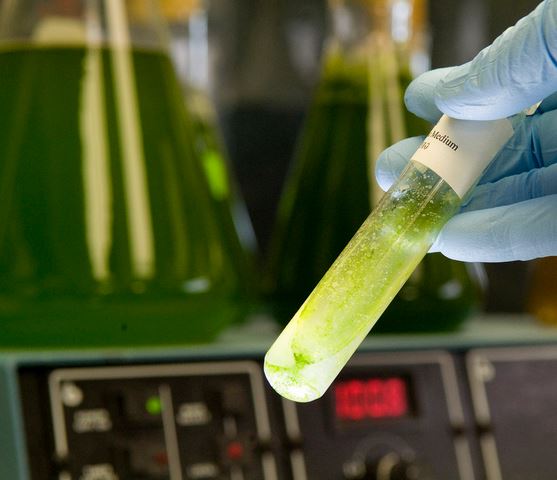How algae could fuel your car one day

Scientists at TU Delft in the Netherlands may have made some progress in the world of algae as a biofuel. By cultivating only the fattest – in this case the best – sea plants, researchers could extract the most oil possible and make algae oil a viable fuel alternative, PhsyOrg reports.
Researchers have been examining algae’s potential as a biofuel since 1978 when gas prices rocketed, prompting the search for fuel alternatives. But the TU Delft study, which will be published in the scientific journal Energy & Environmental Science this week, builds on the possibility of large-scale production.
“The ultimate goal of our research is to make oil-producing algae as fat as possible, then press the oil out of them and finally produce biodiesel suitable for cars from this oil,” PhD student Peter Mooij told PhysOrg.
Algae produces oil to store carbon and energy – in fact, half of its composition by weight is oil.
According to HowStuffWorks, “algae production has the potential to outperform other potential biodiesel products such as palm or corn.”
One major problem with cultivating oil-producing algae has been the invasion of thinner plants. Methods to deal with this so far have been expensive and complicated.
“Our method is more suitable for large-scale algae production. We try to select for a particular characteristic and not for a particular species of algae … all algae are welcome in our system,” as long as they are fat, Mooji told PhysOrg.
Through a reproduction process in the lab, the team is able to make only the fattest algae multiply – a phenomenon Mooji calls “survival of the fattest.”
One important caveat is that the test environment isn’t yet optimized for storing oil.
See the full PhysOrg report here.
Creative Commons image by: Texas A&M AgriLife
{{ commodity.name }}
{{ post.title }}
{{ post.date }}




3 Comments
Emerson Hopfmann
Such research is commendable. Honest evaluation of the results and practicality of biofuel production is necessary. The problem occurs when ecofreaks and statists promote (and even demand) the use of biofuels before they are economically viable. This is usually done by the use of government subsidies (theft from taxpayers) and irrational regulatory restrictions.
frankinca
Yes, A good start , but far from the finish line. Who will support the project?, it should be oil companies who would benefit the most, if it proves itself. Of course we users of petroleum products will pay a little more for them, as we use the present day version of fuel oil with a research surcharge. Wind has such specific restrictions and solar is in it’s infancy. Conservation, efficiency without pollution is the best answer at the present..
anomymous8888
“Washington, the DOE’s Inspector General
published a 24-page Follow-up Audit of the Department of Energy’s Financial
Assistance for Integrated Biorefinery Projects”, which found that “despite over
7 years of effort and the expenditure of about $603 million, the Department had
not yet achieved its biorefinery development and production goals.” Biofuel Digest – September
18, 2013″